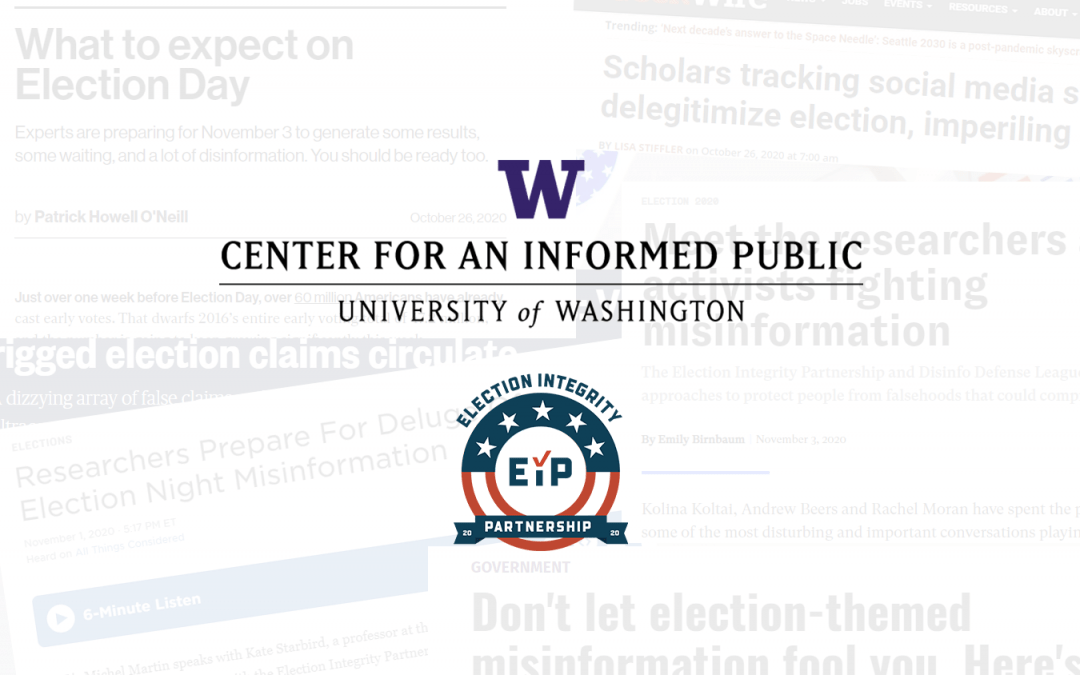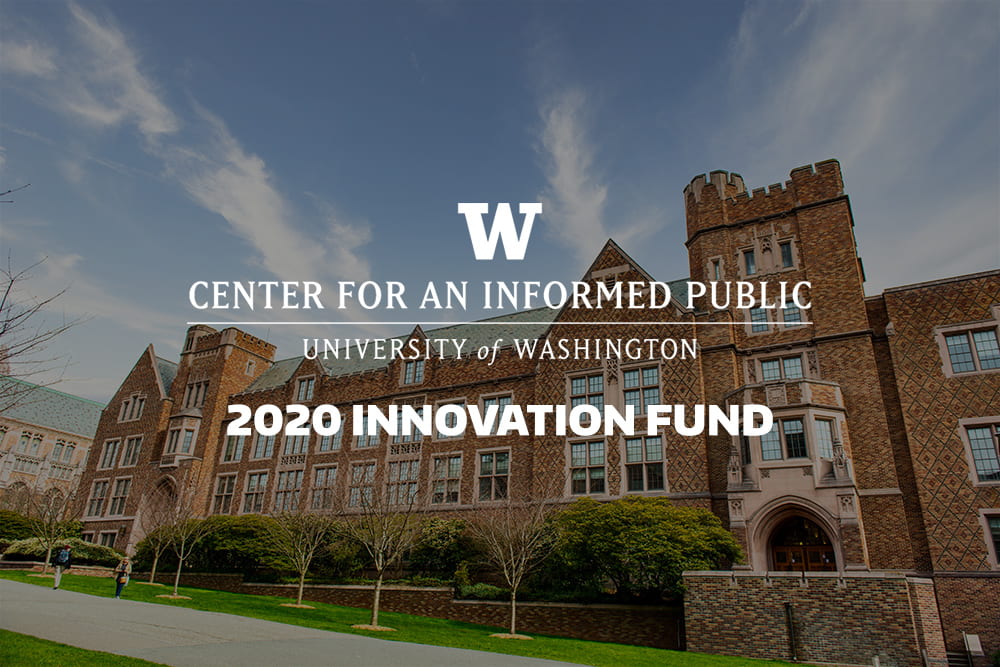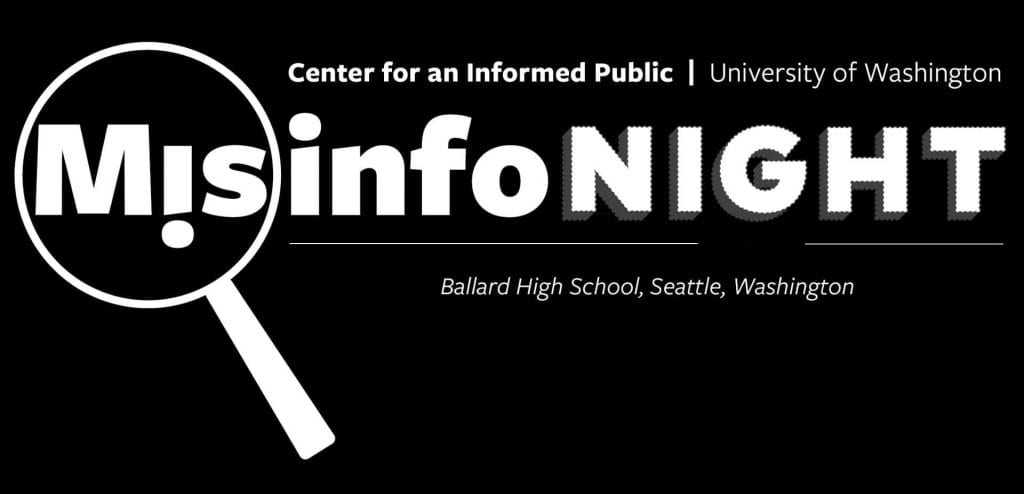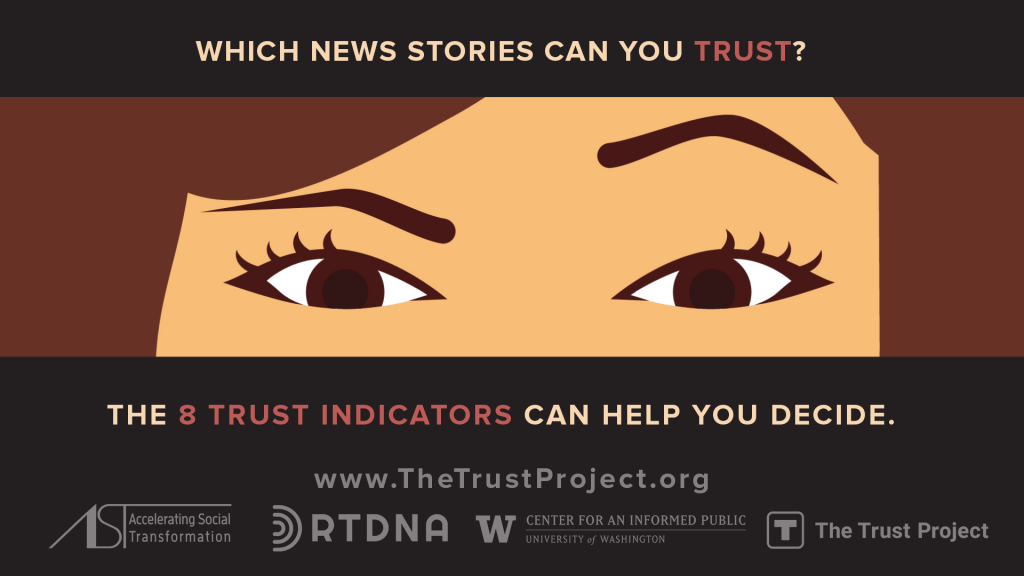This is a web version of the Center for an Informed Public’s News & Insights newsletter for November 2020, which was sent out on Nov. 20. Check out our newsletter archives. Not signed up to received the CIP’s newsletter? Register here.
‘How absolutely predictable’ 2020 U.S. election mis- and disinformation turned out to be
As the monitoring and analysis work of the Election Integrity Partnership — the nonpartisan consortium of disinformation and misinformation researchers, including those from the University of Washington‘s Center for an Informed Public, stood up this past summer ahead of the U.S. elections in collaboration with Stanford Internet Observatory, the Atlantic Council‘s DFR Lab and Graphika — starts to wind down, the research teams that powered the EIP’s work in recent months, including more than a dozen from the UW, are now turning toward writing a comprehensive final report, anticipated for release in January.
CIP co-founder Kate Starbird, a UW Human Centered Design & Engineering associate professor who helped lead the UW team working with the Election Integrity Partnership, joined a post-election webinar hosted by DFR Lab to discuss the rapid-response research collaboration along with some early findings and insights from the EIP’s recent work.
One thing that was surprising, according to Starbird, was “how absolutely predictable” the misinformation and disinformation “was and still is.” Starbird continued: “We even wrote a report we published a week before the election … about how [voting-related misinformation] was going to play out, how the narratives would come up, how they’ve collected incidents from the day of the election and tie them to voter fraud narratives. And that’s exactly how it all played out.”
That EIP report, “Uncertainty and Misinformation: What to Expect on Election Night and Days After,” included major contributions from the CIP’s research team and was featured by numerous news organizations ahead of Election Day, including National Public Radio, MIT Technology Review, CyberScoop and GeekWire.
In an article for The Conversation, which was republished by publications like the Houston Chronicle, Government Executive and the Columbia Missourian, CIP postdoctoral scholar Kolina Koltai outlined “steps you can take to be a good digital citizen and avoid inadvertently contributing to the problem” of sharing election misinformation, as outlined in the EIP’s “What to Expect” report.
This week, in an examination of voting-related misinformation narratives playing out in Michigan, the Detroit Free Press revisited the EIP’s “What to Expect” report and noted: “We saw false narratives that neatly aligned with what the EIP predicted.”
- Watch the DFR Lab’s “What happened: Disinformation in the 2020 elections” Nov. 10 webinar.
- Explore more of the Election Integrity Partnership’s rapid-response analysis work.
Scroll down for more highlights from the Center for an Informed Public’s work, including additional news and information from the CIP’s research collaboration with the Election Integrity Partnership …
- CIP-iSCHOOL LECTURE SERIES: CIP’s Ryan Calo, Mary Fan discuss law, policy, technology and misinformation.
// WATCH … - UW PRESIDENT ANA MARI CAUCE: ‘Misinformation is a threat to self-government.’
// BLOG POST …
- JOIN US DEC. 3: CIP partners with UW Evans School for ‘2020 Elections Retrospective’
// REGISTER …
RESEARCH NOTES
CIP awards Innovation Fund grants to seven research proposals
This fall, the Center for an Informed Public awarded 2020 Innovation Fund grants to seven proposed projects, funding that will help support collaborative, multi-disciplinary and timely projects intended to advance the CIP’s mission to resist strategic misinformation, promote an informed society and strengthen democratic discourse. The Innovation Fund is intended to seed promising new ideas and generate proofs-of-concept. Award amounts average around $10,000 and project periods are 6-12 months. The funding would not have been possible without the support of the John S. and James L. Knight Foundation and the University of Washington’s Technology & Social Change Group.
This year’s grantees include an online misinformation escape room, research into how misinformation spreads within pop music fandom and how anti-science narratives take hold of certain communities.
***
CIP faculty member Tanu Mitra, who started as an assistant professor at the UW Information School in August, presented four papers at the Conference on Computer-Supported Cooperative Work‘s 2020 meeting in October with students she has advised at Virginia Tech, Mitra’s previous institution, and the University of Washington. “What Makes People Join Conspiracy Communities?: Role of Social Factors in Conspiracy Engagement,” which Mitra presented with UW iSchool PhD student Shruti Phadke, was awarded a best paper honorable mention. Mitra presented “Measuring Misinformation in Video Search Platforms: An Audit Study on YouTube” with Prerna Juneja, a UW iSchool PhD student.
***
After wrapping up a term as the 2019-2020 co-chair elect of the Association for Information Science & Technology SIG Social Informatics, CIP postdoctoral scholar Kolina Koltai will co-chair the group for 2020-2021. Koltai ran the SIG’s annual workshop and research symposium at ASIS&T’s 83rd annual meeting in October.
Earlier this fall, Koltai participated in “Manufacturing Policies to Improve Vaccination: Are Mandates the Way Forward?,” a podcast format presentation produced as part of the Interdisciplinary Association for Population Health Science‘s annual meeting. Koltai also participated in workshops at the 2020 annual meeting of the Conference on Computer-Supported Work and the Association of Internet Researchers, where she participated in a video-based presentation to discuss “Vaccine Information Seeking and Sharing: How Private Facebook Groups Contributed to the Anti-Vaccine Movement,” a paper published by AoIR in October.
***
During the “Beyond Disinformation: Authenticity and Trust in the Online World” workshop at the Social Science Research Council‘s annual meeting in October, CIP postdoctoral scholar Rachel Moran presented her work on how partisan and pseudo-media uses personal authenticity as a tool to build trust and how this can be abused to spread mis- and disinformation.
***
In October, UW’s eScience Institute named CIP postdoctoral scholar Joe Bak-Coleman to its UW Data Science Postdoctoral Fellow program. Data science fellows, who are awarded $2,000 for research-related expenses, include current or incoming UW postdocs who are actively involved in developing and/or utilizing advanced data science tools and techniques in their research.
A research paper Bak-Coleman worked on with three other contributors, “The wisdom of stalemates: consensus and clustering as filtering mechanism for improving collective accuracy,” was published in early November in The Proceedings of the Royal Society B.
SPOTLIGHT
Hundreds virtually turn out for Ballard High School ‘MisinfoNight’ presentations
More than 300 Seattle high school students, their parents and educators from Ballard High School gathered virtually on Oct. 28 to watch student presentations about misinformation awareness and education. “MisinfoNight‘ — organized by Ballard High School teachers Shawn Lee, Robin Dowdy and Kyle Morean — gave students the opportunity to educate peers and share their insights after learning techniques for critically analyzing digital media and other online information.
Also in attendance was UW Information School MLIS graduate Liz Crouse, a librarian at Seattle’s Nathan Hale High School who played a key role in developing the curriculum used to prepare students and is working with the Center for an Informed Public to organize MisinfoDay 2021.
The event kicked off with a keynote discussion featuring Center for an Informed Public director Jevin West, who detailed the CIP’s mission and highlighted the center’s recent work with the Election Integrity Partnership, a consortium of disinformation/misinformation researchers. West, an associate professor at the iSchool, remarked how the skills student presenters have developed for MisinfoNight are valuable amid a climate of fading trust in institutions.
CIP joins Trusted Journalism Partnership PSA campaign
Ahead of the U.S. elections, the Trusted Journalism Partnership, a coalition of nonpartisan academic and media organizations, including the Center for an Informed Public, launched a public service announcement campaign focusing on people aged 65 and over, encouraging them to take a reflective pause and consider whether a news story is true or not before sharing it on social media.
INSIGHTS
Don’t expect risks from deepfakes to go away
Earlier this year, the Center for an Informed Public and Microsoft‘s Defending Democracy Program partnered to develop tools and programming to raise awareness about so-called deepfakes and other forms of synthetic media that had the potential to influence or disrupt the elections. Disinformation researchers monitoring the U.S. elections didn’t surface any notable deepfakes targeted at voters. But just because disruptive deepfakes weren’t deployed by malicious actors in the U.S. elections, this time around, that doesn’t mean that the risk has gone away.
Deepfakes are “an A-bomb in a system that’s already a mess,” CIP director Jevin West, an associate professor at the UW iSchool, said in a recent interview with American Public Media‘s Marketplace about deepfakes and other synthetic images. “The problem is that there’s a lot of cheaper tools and lies and misleading strategies that are being employed right now that the A-bomb really hasn’t even come to rear its ugly face yet, at least in this U.S. election. It has in other elections over the last couple years around the world, but this A-bomb, I think, will arise at some point. And that’s why it’s really important for he public to at least be aware of this technology.”
- Read a transcript of Jevin West’s Marketplace interview.
- Explore the CIP’s “Deepfakes and the 2020 U.S. Elections and Beyond: Lessons from the 2020 Workshops” report and take our Spot the Deepfakes quiz.
CIP IN THE NEWS
Since the Center for an Informed Public officially launched late last year, our researchers have been regularly interviewed, quoted or otherwise featured in various local, regional and national news outlets, livestreams and podcasts.
Here are recent highlights featuring the CIP and the CIP’s work with the Election Integrity Partnership …
In an Election Day feature on the Election Integrity Partnership‘s research collaboration, tech magazine Protocol spotlighted the work of people working across the research consortium, including those at UW’s Center for an Informed Public like Andrew Beers, a PhD student in the UW Department of Human Centered Design & Engineering, and CIP postdoctoral scholars Kolina Koltai and Rachel Moran.
“This is not a five-person project,” Koltai explained to Protocol. “We have a huge group of undergraduates, masters, PhD students, postdocs, as well as people from the private sector. It has been a huge collaborative effort.”
CIP postdoctoral scholar Joe Bak-Coleman was interviewed about EIP-related research by journalists from The Wall Street Journal and NBC News. “Instead of evidence, we’re assaulted with a plethora of claims seeking to undermine faith in the election, ranging from confusion to clearly fabricated,” Bak-Coleman told NBC News in an article about the dizzying array of false claims and conspiracy theories that emerged on and after Election Day. “Individually, none of these claims could stand up to a moment’s scrutiny, but collectively they’re deafening, urging the average citizen to give up and accept the ambiguity.”
Ian Kennedy, a UW Department of Sociology graduate student working as part of the EIP, was interviewed by Bridge Michigan, a nonprofit state policy news publication, about social media narratives around an incident in Antrim County, Michigan that had been falsely claimed as evidence of wrongdoing to undermine the integrity of the election. “The election results are really clear, and in order for them to change, there would have to be something systematically wrong,” Kennedy said. “And so this, even though it’s false, offers a false narrative of systemic wrongdoing. But like other claims of voter fraud, there’s no evidence for it.”
Among the news organizations writing about the Election Integrity Partnership and the CIP’s research contributions: Science, The New York Times, The Washington Post, The Associated Press, Reuters, CNN, Politico, Roll Call, KUOW Public Radio in Seattle, KIRO-TV in Seattle, KPNH-TV in Phoenix, Oklahoma Watch, Spain’s RTVE and the South China Morning Post in Hong Kong.
In other recent highlights …
- Scripps National News featured Kolina Koltai in a video interview about how Facebook banning anti-vaccination ads does not address a larger issue of institutional trust. [Scripps National News]
- Koltai was quoted in a Seattle Times article that discusses how the coronavirus vaccine’s rapid development and political influence has led to skepticism: “We are seeing people otherwise normally classified as pro-vaccine, who think childhood vaccines are safe, who now have reservation about a [coronavirus] vaccine.” [The Seattle Times]
- Koltai was also interviewed by Sojourners in an article about how to talk to friends and family who embrace and share conspiracy theories. “If you can do your research together, that’s a great way to go because it shows that you want to have an open, facilitating conversation,” Koltai said. “See if there are certain sources that you can agree upon. [Sojourners]
- Oregon Public Broadcasting radio show Think Out Loud featured Rachel Moran in a conversation about how to speak with friends and loved ones caught in a web of misinformation. [Oregon Public Broadcasting]
- CIP director Jevin West was featured in an episode of the Crosscut Talks podcast in which he discussed attempts to delegitimize the U.S. presidential election and the potential effects of misinformation on American democracy. [Crosscut Talks]
- The SETI Institute featured CIP faculty member Carl Bergstrom on a podcast about skepticism in which he offered advice on how to fact check information and encouraged listeners to ask: “Who is telling me this, how do they know it, and what are they trying to sell me?” [SETI Institute]
- Wisconsin Public Radio‘s The Morning Show interviewed West in a conversation about the effect of misinformation on society and how to spot and decipher misinformation on social media. [Wisconsin Public Radio]




